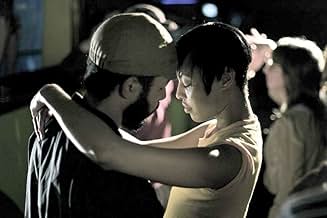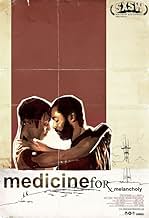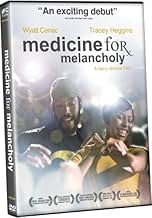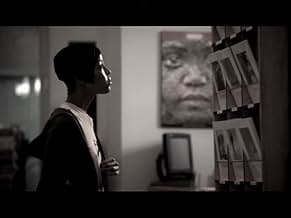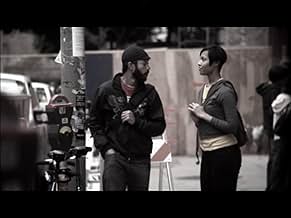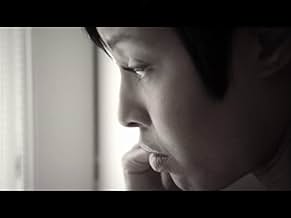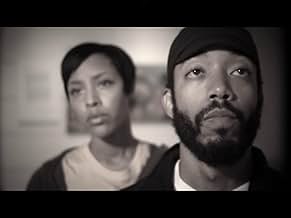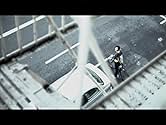IMDb रेटिंग
6.6/10
2.8 हज़ार
आपकी रेटिंग
अपनी भाषा में प्लॉट जोड़ेंTwenty-four hours in the tentative relationship of two young San Franciscans also dealing with the conundrum of being a minority in a rapidly gentrifying city.Twenty-four hours in the tentative relationship of two young San Franciscans also dealing with the conundrum of being a minority in a rapidly gentrifying city.Twenty-four hours in the tentative relationship of two young San Franciscans also dealing with the conundrum of being a minority in a rapidly gentrifying city.
- पुरस्कार
- 2 जीत और कुल 10 नामांकन
Melissa Bisagni
- Sierra Orneilias
- (as Melisa Bisagni)
Chida Emeka
- Hydration Hustler 1
- (as Chidi Emeka)
Ondine Kilker
- Ondine Kilcher - Housing Rights Meeting Attendee
- (as Ondine Kilcher)
फ़ीचर्ड समीक्षाएं
Twenty-four hours in the tentative relationship of two young San Franciscans also dealing with the conundrum of being a minority in a rapidly gentrifying city.
Barry Jenkins has described the film's two main characters as "playing out a debate back and forth about identity politics". Each of the two main characters embodies an ideology. Jenkins saw the character of Micah as a man who was always building barriers, whereas Jo thinks that race is a limiter. Accusing Jo of assimilation, Micah strives to reclaim his essential "blackness" as Jo contrastingly claims Micah has a "hang up" about his race and strives to overcome her own.
Roger Ebert gave the film 3.5 out of 4 stars, calling the actors "effortlessly engaging" and the direction "assured"; he also noted the film was "beautifully photographed". Ebert is right on all counts. The acting is superb, very natural, and really shows off Wyatt Cenac as more than a comedian. The direction is strong, and the cinematography is gorgeous, some of the best you will find anywhere, whether in a big budget film or indie.
The discussion of race is great. As a white man, maybe I can't see the issue from the point of view of Micah, Jo or Barry Jenkins. But I love that there's this divide of ideas. Micah is indignant, as he should be, about being a minority. But Jo prefers to look forward. Indeed, how does one define themselves? I don't think of myself as "white", and sometimes not even as a "man", but do these things define me whether or not I choose to accept them?
Barry Jenkins has described the film's two main characters as "playing out a debate back and forth about identity politics". Each of the two main characters embodies an ideology. Jenkins saw the character of Micah as a man who was always building barriers, whereas Jo thinks that race is a limiter. Accusing Jo of assimilation, Micah strives to reclaim his essential "blackness" as Jo contrastingly claims Micah has a "hang up" about his race and strives to overcome her own.
Roger Ebert gave the film 3.5 out of 4 stars, calling the actors "effortlessly engaging" and the direction "assured"; he also noted the film was "beautifully photographed". Ebert is right on all counts. The acting is superb, very natural, and really shows off Wyatt Cenac as more than a comedian. The direction is strong, and the cinematography is gorgeous, some of the best you will find anywhere, whether in a big budget film or indie.
The discussion of race is great. As a white man, maybe I can't see the issue from the point of view of Micah, Jo or Barry Jenkins. But I love that there's this divide of ideas. Micah is indignant, as he should be, about being a minority. But Jo prefers to look forward. Indeed, how does one define themselves? I don't think of myself as "white", and sometimes not even as a "man", but do these things define me whether or not I choose to accept them?
Micah and Jo' wake up next to one another after an one-night-stand at a drunken party. Slipping away they awkwardly go their separate ways, but Micah sees her later to return her wallet. They spend the remainder of that day together, biking and walking around San Francisco and chatting generally as they go. This is about the size of the plot and those looking for more of a definite narrative should probably be warned that this is very much a niche indie film that will appeal chiefly to those that like the film almost before they have seen it. I'm not sure if I fall into that category as an older casual viewer but then I did make a certain amount of effort to get hold of the film so I suppose I did have a vested interest to like it. And mostly I did like it: mostly.
The low-key indie feel of the whole film will feel pretentious to some I'm sure but for me it had a certain lo-fi charm that came from the project as a whole. Although the path of the two characters didn't really strike me as realistic or convincing, the charm with which it was delivered helped me to put this out of my mind for the most part. This allowed me to hang out with them as they bumble around the city together in a way that will be recognisable to anyone who has done the same in any major city. In this regard I really liked the film and I enjoyed the "coolness" of it and I didn't care too much that "nothing was happening" in a traditional sense.
This makes for a very slight film and it needed to have a conclusion that fits that – which it sort of does, the problem is more what it includes in the final third. We suddenly have discussions over race that feel clunky compared to the majority of the scenes that had gone before; this made it a little grating and didn't fit with the rest of the film. Of course this does fit well when compared to the sudden introducing of a meeting of random people discussing gentrification in San Francisco, this doesn't fit at all and indeed this sudden introduction of social commentary just clunks onto the screen without any real context or relevance, giving the impression that the film wants to have this aspect but wasn't able or willing to make it part of the whole film, but rather just one scene.
The charm of it is key though and the casting was very important in making this work. Finding Wyatt Cenac in the lead was a surprise and perhaps a bit of a worry since I generally find him to be the least able of those on the Daily Show; I like him but his performances on that show are never as good as John Olivier, Larry Wilmore or some of the stronger ones. Here though he is awkwardly charming in a weird geeky way. He does walk a fine line because at times he could have been irritating but he keeps it on the right side of the line. He is helped a lot by his chemistry with Heggins. She is wonderfully awkward and cute; OK she never got her character's motivations through to me but I still really took to her and to both of them together.
Medicine for Melancholy is a very slight film though and it is not something to come to with high expectations. Rather the indie design and delivery is something that charms those that left it, thanks to the work by maker Jenkins and also the chemistry of the lead two. The attempts to have some form of commentary or meaning in it really clunk towards the end but ultimately, while not great, it is a lo-fi indie pleasure.
The low-key indie feel of the whole film will feel pretentious to some I'm sure but for me it had a certain lo-fi charm that came from the project as a whole. Although the path of the two characters didn't really strike me as realistic or convincing, the charm with which it was delivered helped me to put this out of my mind for the most part. This allowed me to hang out with them as they bumble around the city together in a way that will be recognisable to anyone who has done the same in any major city. In this regard I really liked the film and I enjoyed the "coolness" of it and I didn't care too much that "nothing was happening" in a traditional sense.
This makes for a very slight film and it needed to have a conclusion that fits that – which it sort of does, the problem is more what it includes in the final third. We suddenly have discussions over race that feel clunky compared to the majority of the scenes that had gone before; this made it a little grating and didn't fit with the rest of the film. Of course this does fit well when compared to the sudden introducing of a meeting of random people discussing gentrification in San Francisco, this doesn't fit at all and indeed this sudden introduction of social commentary just clunks onto the screen without any real context or relevance, giving the impression that the film wants to have this aspect but wasn't able or willing to make it part of the whole film, but rather just one scene.
The charm of it is key though and the casting was very important in making this work. Finding Wyatt Cenac in the lead was a surprise and perhaps a bit of a worry since I generally find him to be the least able of those on the Daily Show; I like him but his performances on that show are never as good as John Olivier, Larry Wilmore or some of the stronger ones. Here though he is awkwardly charming in a weird geeky way. He does walk a fine line because at times he could have been irritating but he keeps it on the right side of the line. He is helped a lot by his chemistry with Heggins. She is wonderfully awkward and cute; OK she never got her character's motivations through to me but I still really took to her and to both of them together.
Medicine for Melancholy is a very slight film though and it is not something to come to with high expectations. Rather the indie design and delivery is something that charms those that left it, thanks to the work by maker Jenkins and also the chemistry of the lead two. The attempts to have some form of commentary or meaning in it really clunk towards the end but ultimately, while not great, it is a lo-fi indie pleasure.
First, a comment to the two reviewers who found this film 'slow,' etc;
The pace of films - for MOST of the 20th century were at a much slower pace. It lets the director get to know the characters, etc.
In today's film market - in which a HUGE part of the pie is overseas sales/distribution - dialogue doesn't translate, but, ACTIONS do.
That's one of the reasons why most films of the past decade or so, have interchangeable plots, characters - the story is second to the action.
Saying that, let me talk about MEDICINE FOR MELANCHOLY.
I came in a few minutes after it had begun. I'd never seen, nor heard of it (my friend had left the TV on, and was actually watching something prior - FLAWLESS, with R. DeNiro.
I came in when Micah was in a cab bringing the lost wallet he'd found back to it's owner, Jo (I know that they'd had casual sex just before this, and didn't know each other).
I got caught up in the dialogue. It was slow. It as natural, as to how two people meet (awkwardly) at inopportune times.
I quickly picked up on the ambivalence Jo' was having, and Micah, just trying (at first) to get to know Jo a bit.
The film follows them throughout that day - and that night, as the two start to reveal more of themselves. A third important cast member, who's very important, is the sprawling city of San Francisco.
I love the cinematography done on this film. It's a loving portrayal of San Francisco.
The pair walk through streets, and neighbourhoods, that are far from the shiny images tourists see, or think of, when they hear the city's name.
As for the performances of both the two (verbal) actors, I enjoyed their charisma, and I hope to see more from them in the future.
MEDICINE FOR MELANCHOLY is not for people who are impatient, or 'don't get' plots. But, for those who enjoy spending an afternoon, and just letting a film wash over you, this one's definitely one to watch.
The pace of films - for MOST of the 20th century were at a much slower pace. It lets the director get to know the characters, etc.
In today's film market - in which a HUGE part of the pie is overseas sales/distribution - dialogue doesn't translate, but, ACTIONS do.
That's one of the reasons why most films of the past decade or so, have interchangeable plots, characters - the story is second to the action.
Saying that, let me talk about MEDICINE FOR MELANCHOLY.
I came in a few minutes after it had begun. I'd never seen, nor heard of it (my friend had left the TV on, and was actually watching something prior - FLAWLESS, with R. DeNiro.
I came in when Micah was in a cab bringing the lost wallet he'd found back to it's owner, Jo (I know that they'd had casual sex just before this, and didn't know each other).
I got caught up in the dialogue. It was slow. It as natural, as to how two people meet (awkwardly) at inopportune times.
I quickly picked up on the ambivalence Jo' was having, and Micah, just trying (at first) to get to know Jo a bit.
The film follows them throughout that day - and that night, as the two start to reveal more of themselves. A third important cast member, who's very important, is the sprawling city of San Francisco.
I love the cinematography done on this film. It's a loving portrayal of San Francisco.
The pair walk through streets, and neighbourhoods, that are far from the shiny images tourists see, or think of, when they hear the city's name.
As for the performances of both the two (verbal) actors, I enjoyed their charisma, and I hope to see more from them in the future.
MEDICINE FOR MELANCHOLY is not for people who are impatient, or 'don't get' plots. But, for those who enjoy spending an afternoon, and just letting a film wash over you, this one's definitely one to watch.
You couldn't make a movie that looks more like my day to day life in San Francisco than this. Telling the story of two black twenty-somethings who meet and have a one night stand, they start off the morning after in Bernal Heights, walk over to Noe Valley for breakfast, hop a cab to the Marina to drop her off, then he heads back to his studio on Geary at Hyde, two blocks from where I once rented a nearly identical apartment, down to the rotating walk-in closet door that once sported a Murphy bed. The couple meet again and head to the Museum of the African Diaspora on Mission and then over to Yerba Buena Gardens to ride the merry-go-round, both a block away from where I work. Later that night they buy stuff for dinner at Rainbow Grocery then head down to the Knockout to dance while my pal DJ Paul Paul spins 45s although his oldies singles are overdubbed on the film's soundtrack with obscure but cool indie rock. But aside from the pleasure of seeing all my usual haunts captured on on film, or digital video rather, Medicine For Melancholy is a smart movie that captures not only the vibe of life in downtown San Francisco, but also the subtleties of the changing ethnic and economic demographics of the second most expensive city in the country. The guy—played by Wyatt Cenac, an occasional correspondent on John Stewart's Daily Show—has a deadpan quarrelsomeness that is occasionally hilarious, because not only is he concerned about the ongoing disenfranchisement of the black community in the city, he's also bugged about the pending disenfranchisement of himself from the girl's pants once her live-in boyfriend returns to town. Her boyfriend, by the way, is white, which Cenac's character tries to elevate to a political issue because of his looming romantic frustration, but she's not having it, which leads to one of the film's best exchanges as they argue about the role race plays in forming their sense of self-identity. Lots of clever relationship stuff, like surreptitiously scoping out each other's MySpace profiles and sharp naturalistic dialogue as they continually negotiate and renegotiate the emotional boundaries and ending point of their one day affair. And maybe the scene with the housing activists meeting was a digression, but you know what, if you live here that stuff is very important and on everybody's mind, and it fits nicely given the context of the film whether you like it or not. Highly recommended.
10matty03
I wasn't sure what to expect when I sat down to view this film. I knew it had been filmed here in San Francisco and had won some praise. And, I knew it was low-budget/indie.
However, nothing prepared me for the beauty and quiet power of this film. Aside from the painfully beautiful and realistic performances of the two actors and the story of a stretched out one night stand is something that more than a few of us can relate to/with --- what really makes this film stand out for me is the artistic use of editing and cinematography.
The director has created a sharp and tightly made film. Not in color and not in black and white -- the film really sparkles by use of some form of muted visual effect that works on multiple levels considering the story, emotions, actions and lives of the two characters. The editing is perfect -- creating a pace which is both natural and urgent all at once.
I found this film to be close to perfect and elegant.
I suspect we will see a number of indie filmmakers attempt to copy the style of this film.
How refreshing to see a truly original film which never falls back on cliché or indie film tricks.
I also found the use of San Francisco to be quite clever. The city acts as not only a sort of symbol for various aspects of the characters and their relationship but almost as a third character hovering in every single scene.
This is movie not to be missed!
However, nothing prepared me for the beauty and quiet power of this film. Aside from the painfully beautiful and realistic performances of the two actors and the story of a stretched out one night stand is something that more than a few of us can relate to/with --- what really makes this film stand out for me is the artistic use of editing and cinematography.
The director has created a sharp and tightly made film. Not in color and not in black and white -- the film really sparkles by use of some form of muted visual effect that works on multiple levels considering the story, emotions, actions and lives of the two characters. The editing is perfect -- creating a pace which is both natural and urgent all at once.
I found this film to be close to perfect and elegant.
I suspect we will see a number of indie filmmakers attempt to copy the style of this film.
How refreshing to see a truly original film which never falls back on cliché or indie film tricks.
I also found the use of San Francisco to be quite clever. The city acts as not only a sort of symbol for various aspects of the characters and their relationship but almost as a third character hovering in every single scene.
This is movie not to be missed!
क्या आपको पता है
- ट्रिवियाMade on a budget of $13,000.
- क्रेज़ी क्रेडिटEach song in the soundtrack appears in the credits with a still frame from the part of the movie where it was used.
टॉप पसंद
रेटिंग देने के लिए साइन-इन करें और वैयक्तिकृत सुझावों के लिए वॉचलिस्ट करें
- How long is Medicine for Melancholy?Alexa द्वारा संचालित
विवरण
- रिलीज़ की तारीख़
- कंट्री ऑफ़ ओरिजिन
- आधिकारिक साइट
- भाषा
- इस रूप में भी जाना जाता है
- Remedio para melancólicos
- फ़िल्माने की जगहें
- उत्पादन कंपनियां
- IMDbPro पर और कंपनी क्रेडिट देखें
बॉक्स ऑफ़िस
- बजट
- $13,000(अनुमानित)
- US और कनाडा में सकल
- $1,11,551
- US और कनाडा में पहले सप्ताह में कुल कमाई
- $12,625
- 1 फ़र॰ 2009
- दुनिया भर में सकल
- $1,11,551
- चलने की अवधि1 घंटा 28 मिनट
- रंग
- पक्ष अनुपात
- 1.78 : 1
इस पेज में योगदान दें
किसी बदलाव का सुझाव दें या अनुपलब्ध कॉन्टेंट जोड़ें






